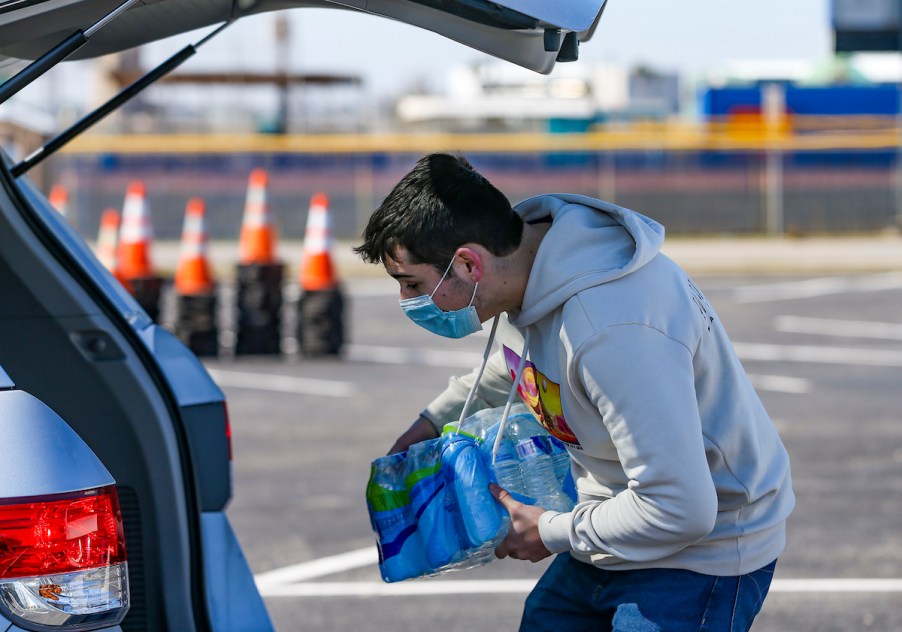
10 Things You Should Never Leave in Your Car During Winter
Winter weather can be hard on you and your vehicle. So it’s best to prepare your car for the season and learn the best tips and tricks for driving safely in snowy or icy conditions. But winter car safety goes further than that.
Know what you should and shouldn’t keep in your vehicle when freezing temperatures strike. Here’s a look at the items you should never leave out in the cold.
Beverages

According to Bob Vila, you shouldn’t leave containers of water, soda, or other beverages in your car when temperatures drop below freezing. The liquid can freeze at 32 degrees Fahrenheit and crack the containers. When they thaw, they’ll leak in your car.
Aerosol cans
Pressure can build up inside aerosol cans of hairspray, antiperspirant, spray paint, and the like. Manufacturers recommend these cans be stored at 45 to 65 degrees. If you leave one in your vehicle overnight when temps drop below freezing, they could crack and even explode, leaking contents onto your seats and flooring.
Household cleaners
Many household cleaners contain water mixed with chemicals. Like beverages, the liquid could freeze and crack the plastic containers. The chemical cleaners will leak inside your car. And some cleaners, such as laundry soap, can clump after thawing, making them lose their effectiveness.
Electronics
This includes cell phones, laptops, and tablets. Many of these devices have lithium-ion batteries, which are not meant to be stored in cold temperatures. Cell phones and other computer-like items will collect condensation on their interior components, causing the device to wear out faster. Besides, you don’t want thieves to steal your electronics.
Eyelasses and sunglasses
The same goes for eyeglasses and sunglasses. Though you might leave them in the car all the time for convenience’s sake, you shouldn’t in the winter. Freezing temperatures can cause the frames to warp and the lenses to crack. In some instances, the frames could even break. If you have high-end glasses, you could be out quite a bit of money.
Canned goods
Canned goods are usually stored in a water mixture, which can freeze at certain temperatures. The expansion could damage the can and also break the seal, allowing bacteria to enter and contaminate the food. You could thaw it out, open it up, and see if it smells funny, but it’s best to throw it out.
Eggs
Eggshells protect the eggs’ interior from contamination. However, if you leave eggs in your vehicle when temperatures drop to freezing, the shells can get damaged, allowing germs and bacteria to enter. If the eggs thaw and the shell is fine, they still might not taste good when cooked.
Medications
Medications are sensitive to temperature extremes. In fact, they can lose their effectiveness if they get too cold. Liquid medicines, such as cough syrup, eye drops, and insulin, have a higher chance of freezing and becoming ineffective. It’s best to take them into your home or leave them in your pocket or purse as you go about your day.
Gas tank low on fuel
In the wintertime when temperatures drop below freezing, the last thing you want is to leave your car with a near-empty gas tank. The fuel lines can freeze, causing issues with your car. Always keep the gas tank at least half full to avoid situations where your vehicle won’t run.
Bottles of alcohol
Though you wouldn’t think alcohol would freeze, it can, around 21 to 23 degrees. When it does, bottles are prone to crack and break. And when the alcohol thaws, you’re in for a big mess, especially if it’s red wine.
What you can leave in your car in the winter
The first thing you should have in your vehicle is a winter readiness kit. Should something unforeseen happen, like getting stuck in a snowstorm, you’ll have some of the essential items you’ll need to get you through until help comes. The kit could include a small shovel, blankets, a first aid kit, and a flashlight, to name a few.
According to Reader’s Digest, a gas can is another essential item to have in your car year-round, but especially in the winter. Should you run out of gas, you can walk to the nearest station for fuel and get back to your vehicle. Once you’ve emptied the gas into the car, you can drive to the station to fill it up.
It would also be a good idea to keep a jump starter in your vehicle. How often have you gone somewhere, gotten back into our car to go home, and found the battery dead? A jump starter carries enough charge to get your battery going and down the road. But remember to recharge the device and put it back in your car for next time.
When winter comes, you need to be aware of what items you should take out of your vehicle and which ones you should store in it in case you need them later. This will help you avoid the frustrations of leaky containers and busted bottles in your car that will be even more annoying to clean up afterward.


